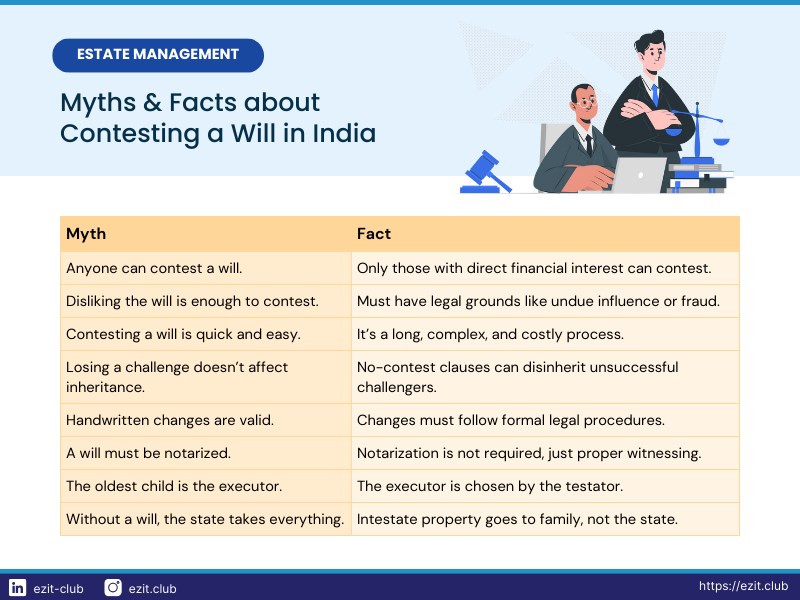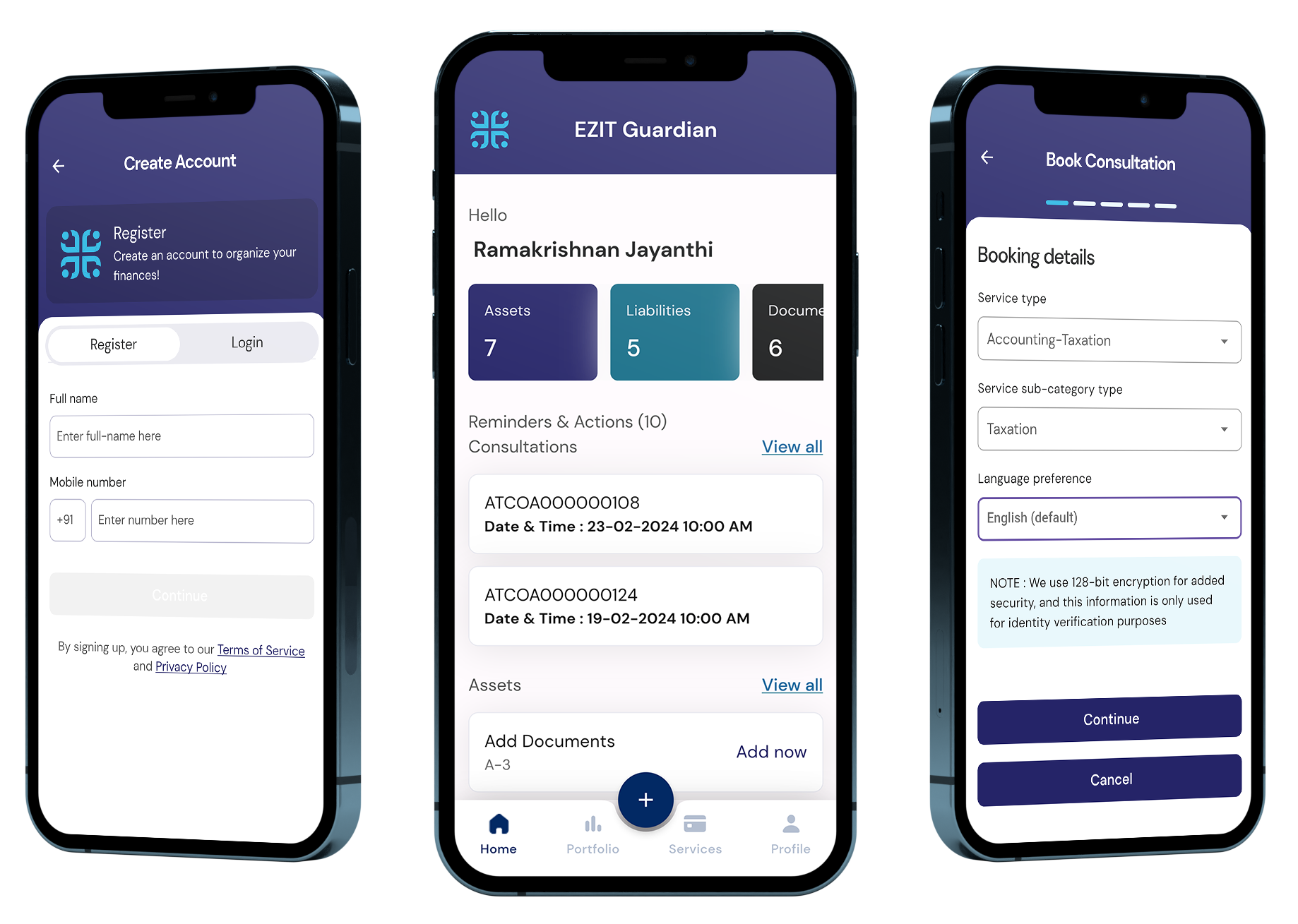TL;DR
Contesting a will in India is often misunderstood, but there are key facts to keep in mind. Only individuals with a direct financial interest can challenge a will, and valid grounds include the will-maker’s lack of mental capacity, undue influence, or improper execution. The process of contesting a will can be lengthy and expensive, and an unsuccessful challenge may result in the loss of inheritance rights. It’s important to note that verbal promises cannot override the provisions of a written will. Therefore, seeking proper legal advice is crucial before pursuing any will contest.
Introduction
When it comes to challenging a will in India, there are many misconceptions that can lead to confusion and potentially costly mistakes. This article aims to separate fact from fiction, providing you with accurate information about the process of contesting a will in India. Whether you’re considering challenging a will or simply want to understand the process better, this guide will help you understand the complexities involved in will contests.
Myths and Facts About Contesting a Will in India
Myth 1: Anyone can contest a will
Fact: Not everyone has the legal right to contest a will. Generally, only those who have a direct financial interest in the estate can challenge a will. This typically includes:
- Beneficiaries named in the will
- Individuals who would inherit under intestacy laws if the will were invalid
- Creditors of the deceased
- In some cases, dependents who were not adequately provided for in the will
Myth 2: You can contest a will simply because you don't like its contents
Fact: Disagreeing with the distribution of assets is not a valid legal ground for contesting a will. You must have a legitimate legal reason, such as:
- Lack of testamentary capacity
- Undue influence or coercion
- Fraud or forgery
- Improper execution of the will
Myth 3: Contesting a will is a quick and easy process
Fact: Challenging a will can be a lengthy, complex, and expensive process. It often involves:
- Gathering substantial evidence
- Filing legal paperwork
- Attending multiple court hearings
- Potentially waiting months or even years for a resolution
Myth 4: If you contest a will and lose, you'll still get your original inheritance
Fact: Many wills include a “no-contest” clause, which can disinherit anyone who unsuccessfully challenges the will. Even without such a clause, unsuccessful challenges can deplete the estate’s assets, potentially reducing everyone’s inheritance.
Myth 5: Handwritten changes to a will are always valid
Fact: While handwritten wills (called holographic wills) are valid in some jurisdictions, in India, any changes to a will typically need to follow the same formal procedures as the original will, including proper signing and witnessing.
Myth 6: A will is invalid if it's not notarized
Fact: In India, notarization is not a legal requirement for a will to be valid. A will only needs to be in writing, signed by the testator, and attested by two witnesses.
Myth 7: The oldest child automatically becomes the executor of the will
Fact: The executor is named in the will by the testator. It can be anyone the testator trusts, not necessarily a family member or the oldest child.
Myth 8: If someone dies without a will, the state takes all their property
Fact: When someone dies without a will (intestate), their property is distributed according to intestacy laws, which typically prioritize close family members. The state only takes the property if no legal heirs can be found.
Myth 9: Once a will is submitted for probate, it's too late to contest it
Fact: In India, you can contest a will during the probate process. In fact, the probate process is often the time when challenges to the will are raised.
Myth 10: Verbal promises override what's written in the will
Fact: Generally, verbal promises don’t supersede the written contents of a will. For a change to be legally binding, it typically needs to be made in writing and follow proper will execution procedures.
The Legal Process for Contesting a Will in India
If you’re considering contesting a will, understanding the legal process is essential:
- Collect Evidence: Gather all necessary documents, such as medical records, witness statements, or financial paperwork, to support your claim.
- File a Probate Petition: A will must undergo probate (the legal validation process) before being executed. During this time, objections can be raised by interested parties.
- Send a Legal Notice: A lawyer can issue a formal legal notice to the executor, outlining your objections and intention to contest the will.
- File a Lawsuit: If the issue remains unresolved, you can file a lawsuit in the appropriate civil court, typically where the deceased resided.
- Court Proceedings: Both sides will present arguments, evidence will be examined, and witnesses may be called. This process can extend over several months or even years.
- Court Ruling: After considering all arguments and evidence, the court will issue a decision, either upholding the will, invalidating it, or making necessary adjustments.
Consequences of Contesting a Will
Before proceeding, it’s important to consider the potential outcomes:
- Financial Costs: Legal battles can be costly, with fees for lawyers, court, and expert witnesses.
- Time Commitment: Contests can take years, demanding a significant investment of time and emotional energy.
- Impact on Family: Will disputes often lead to strained family relationships, so it’s vital to weigh whether the potential reward justifies the potential damage.
- Uncertain Results: While a successful challenge could result in a larger inheritance, an unsuccessful one could leave you with nothing, particularly if a no-contest clause exists in the will.
Conclusion
Understanding the realities of contesting a will in India is crucial for anyone considering this legal action. While challenging a will is possible under specific circumstances, it’s not a decision to be taken lightly. The process can be complex, time-consuming, and potentially damaging to family relationships.
Many common beliefs about will contests are myths, including the idea that anyone can contest a will or that it’s a quick and easy process. In reality, only those with a legitimate interest can challenge a will, and the grounds for contestation are limited by law.
Before deciding to contest a will, it’s essential to:
- Understand your legal standing and the validity of your claim
- Consider the potential costs, both financial and emotional
- Evaluate the strength of your evidence
- Reflect on the possible outcomes and their implications
Remember, the best way to avoid will contests is to create a clear, legally sound will and communicate openly with your family about your intentions. If you’re considering contesting a will or want to create a will that’s less likely to be challenged, seeking professional legal advice is crucial.
How EZIT Guardian Can Assist
At EZIT Guardian, we simplify the will-making process:
- Our experts explain all legal terms in plain language
- Our team of experts guide you through each step of creating your will
- We offer regular will reviews to keep your document up-to-date
- Our experts can answer any questions about will terminology
Start your 90-day free trial now and join thousands of Indians who have already secured their family’s financial future with EZIT Guardian. Don’t leave your family’s future to chance. Contact EZIT Guardian today to create a clear, legally sound will. Download the EZIT Guardian app from the Google Play Store & App Store today to schedule a consultation and take the first step to start securing your legacy.


